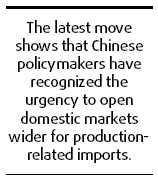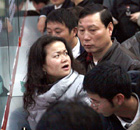Editorials
Going beyond WTO pledge
(China Daily)
Updated: 2009-12-17 08:01
 |
Large Medium Small |
As the leading beneficiary of soaring global trade over the past decade, China's decision to further cut import tariffs next year is not merely to fulfill the country's commitments made upon joining the World Trade Organization (WTO) in 2001.
It is far more important to make this move a first step to substantially increase China's imports for the sake of both boosting domestic consumption and rebalancing the global economy.
The Ministry of Finance announced Tuesday that, in addition to slashing import duties on six commodities from Jan 1 to honor its WTO commitments, China will impose temporarily low import tariffs on more than 600 commodities ranging from resource commodities to advanced production machines.
| ||||
The Ministry of Finance stressed that the move aims to support agriculture and rural development, technologies that will benefit industrial upgrading and equipment manufacturing, energy and environment conservation.

Given the huge domestic needs in these aspects, it is desirable for policymakers to encourage domestic businesses to better tap into the international market and overseas resources by cutting certain import tariffs.
But a more pressing job for the Chinese government is to transform domestic consumption into a key economic growth engine.
As a new WTO member, China has witnessed remarkable expansion of exports in the past decade largely due to its comparative advantage of inexpensive and relatively skillful labor force. But the worst global financial and economic crisis in many decades has made it clear that there is definitely a limit on the country's dependence on exports for growth.
Now, as Chinese authorities vow to go all out to increase domestic consumption, one can see little reason why import duties on consumer goods cannot be further reduced to help fuel a domestic consumption boom.
The latest move shows that Chinese policymakers have recognized the urgency to open domestic markets wider for production-related imports.
However, the step does not appear bold enough.
High import tariffs were once deemed necessary to protect certain infant industries, but the rapid rise of China as a global trade power has borne full testimony to the productivity and competitiveness of Chinese exporters.
If this is no longer a key policy concern, Chinese policymakers can focus more on cutting import tariffs for the benefit of domestic consumers. More imports will be integral to the country's consumer-led growth as well as a balanced recovery of the global economy.
(China Daily 12/17/2009 page8)












